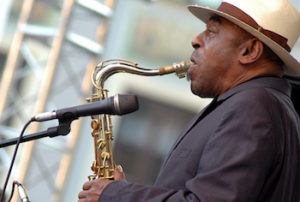
Archie Shepp
*Archie Shepp was born on this date in 1937. He is a Black saxophonist, educator, and playwright who has played a central role in the development of avant-garde jazz since the 1960s.
Archie Shepp was born in Fort Lauderdale, Florida, and raised in Philadelphia, Pennsylvania. Before focusing on tenor saxophone, he studied piano, clarinet, and alto saxophone. Shepp occasionally plays soprano saxophone, alto saxophone, and piano. He studied drama at Goddard College from 1955 to 1959.
He played in a Latin jazz band for a short time before joining the band of avant-garde pianist Cecil Taylor. Shepp's first recording under his name, Archie Shepp - Bill Dixon Quartet, was released in 1962 and featured a composition by Ornette Coleman. Along with John Tchicai and Don Cherry, he was a New York Contemporary Five member. John Coltrane's admiration led to recordings for Impulse! Records, the first of which was Four for Trane in 1964, an album of mainly Coltrane compositions where alto player John Tchicai, trombonist Roswell Rudd, flugelhorn player Alan Shorter, bassist Reggie Workman and drummer Charles Moffett played.
Shepp participated in Coltrane's A Love Supreme sessions in late 1964, but none of the takes he participated in were included on the final LP release (they were made available for the first time on a 2002 reissue). However, Shepp and Tchicai and others from the Four for Trane sessions recorded Ascension with Coltrane in 1965. His place alongside Coltrane at the forefront of the avant-garde jazz scene was epitomized when the pair split a record (the first side a Coltrane set, the second a Shepp set) entitled New Thing at Newport, released in late 1965.
Also in 1965, Shepp released Fire Music, which included the first signs of his developing political consciousness and increasingly Afrocentric orientation. The album took its title from a ceremonial African music tradition and included a reading of an elegy for Malcolm X. Shepp's 1967 The Magic of Ju-Ju also took its name from African musical traditions. The music was strongly rooted in African music, featuring an African percussion ensemble. At this time, many Black jazz artists were increasingly influenced by various continental African cultural and musical traditions; along with Pharoah Sanders, Shepp was at the forefront of this movement.
For the next few years, Shepp's sound was freeform avant-garde saxophone lines coupled with African rhythms and cultural concepts. Shepp was invited to perform in Algiers for the 1969 Pan-African Cultural Festival of the Organization for African Unity. This ensemble then recorded several sessions in Paris. Shepp continued experimenting into the new decade at various times, including harmonica players and spoken word poets in his ensembles. In 1972's Attica Blues and The Cry of My People, he spoke out for American Civil Rights; the former album responded to the Attica Prison riots.
Shepp also writes for theater; his works include The Communist (1965) and Lady Day: A Musical Tragedy (1972). In 1971, Shepp was recruited to the University of Massachusetts Amherst by Randolph Bromery, beginning a 30-year career as a professor of music. Shepp's first two courses were "Revolutionary Concepts in African-American Music" and "Black Musician in the Theater ."Shepp was also a professor of African American Studies at SUNY in Buffalo, New York. In the late 1970s and beyond, Shepp's career went between various old and new territories.
He continued to explore African music while recording blues, ballads, spirituals, and tributes to more traditional jazz figures such as Charlie Parker and Sidney Bechet while dabbling in R&B and recording with various European artists, including Jasper van Hof, Tchangodei, and Dresch Mihály. Shepp is featured in the 1981 documentary Imagine the Sound, discussing and performing his music and poetry. Shepp also appears in Mystery, Mr. Ra, a 1984 French documentary about Sun Ra. The film also includes footage of Shepp playing with Sun Ra's Arkestra.
Since the early 1990s, he has often played with the French trumpeter Eric Le Lann. In 1993, he worked with Michel Herr to create the original score for the film Just Friends. In 2002, Shepp appeared on the Red Hot Organization's tribute album to Fela Kuti, Red Hot, and Riot. Shepp appeared on a "No Agreement" track alongside Res, Tony Allen, Ray Lema, Baaba Maal, and Positive Black Soul. In 2004, Archie Shepp founded his record label, Archieball, with Monette Berthomier. The label is in Paris, France, and includes collaborations with Jacques Coursil, Monica Passos, Bernard Lubat, and Frank Cassenti.
To Become a musician or Singer
To Become a Conductor or Composer